The Best Freight Forwarding Software
Freight forwarding software helps businesses manage shipping and logistics operations. We’ve reviewed top platforms for companies of all sizes, from global carriers to small domestic forwarders.
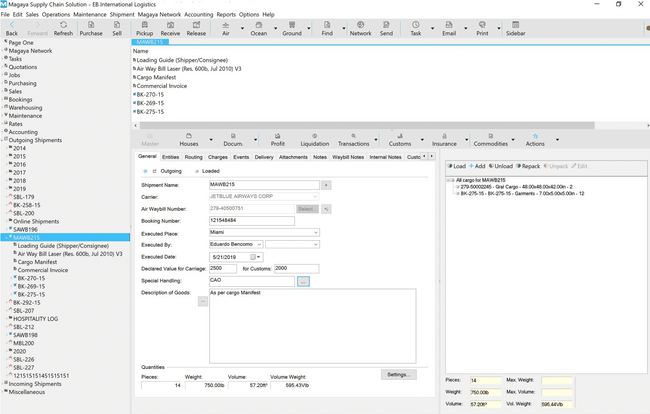
- Predictable pricing
- Fast implementation
- Built-in WMS
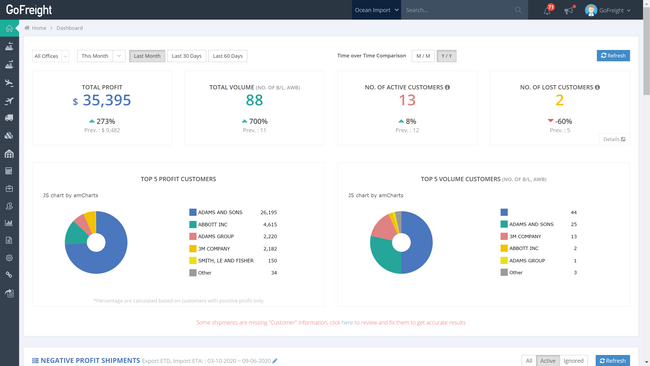
- Dashboard provides quick overview of daily reports
- Integrated container tracking
- Excellent customer support
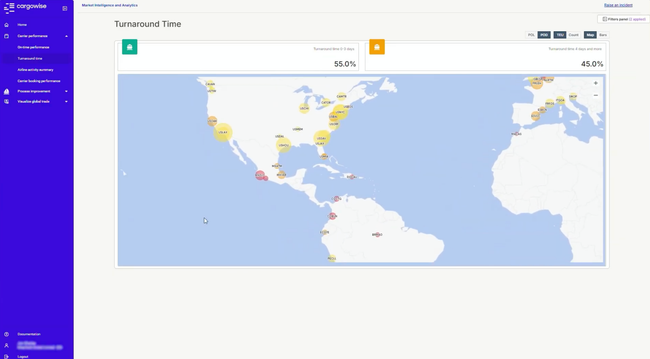
- Users can search and compare rates for multiple routes
- Enables users to manage operations on one database in multiple locations
- Strong exchange rate management tools
This type of software streamlines and automates various processes, including shipment tracking, documentation management, rate procurement, and carrier selection. We used our review methodology to review and rank our favorites.
- Magaya: Best Overall
- GoFreight: Strong Carrier Integration
- CargoWise: Best for Multi-Entity Companies
- GoComet: Best for Global Operations
- Scope: Best End-to-End Logistics Management
- Logitude World: Best for Small and Medium Forwarders
- Linbis: Best for Cargo Management
- Freightview: Best for Domestic Freight Forwarding
- Descartes Aljex: Best for Order Management
Magaya - Best Overall
Magaya Supply Chain offers a streamlined digital freight portal. We like that it provides a branded, interactive experience with the functionalities of a digital forwarder. This portal enhances the user experience by allowing for better customer interaction and service automation — a feature we don’t commonly find in all freight forwarding software.
We also like that Magaya includes dimensioner technology. This is a specialized tool that automates the measurement of cargo dimensions, ensuring precise freight calculations and improving warehouse efficiency. We found its Live View feature useful, allowing users to monitor shipments in real time with status and event updates.
While Magaya Supply Chain is a decent option for freight forwarders, we wouldn’t recommend it for trucking companies needing truck dispatch software. There is also an initial learning curve, especially for new users. To offset this, Magaya offers self-paced online training courses and a knowledge base with how-to articles and videos.
GoFreight - Strong Carrier Integration
GoFreight includes effective carrier integration capabilities. It offers native integration with over 125 ocean, air, and rail carriers as well as 45 U.S. terminals. This allows real-time visibility as the container status can be automatically updated in shipments.
GoFreight integrates with most carrier EDI systems, allowing freight forwarders to automate container tracking and eliminate the need for manual monitoring. We also like that the platform can merge with large carrier portals, which helps users access and manage shipments across multiple carriers on one system.
Additionally, GoFreight’s feature set is comprehensive. While many freight forwarding solutions require third-party accounting software, GoFreight has built-in accounting capabilities. This means that revenue, expenses, and profitability can be tracked directly within the platform without purchasing additional expensive systems. However, GoFreight’s design can be a bit complex and confusing for new users, especially for forwarders using manual paper-based methods.
CargoWise - Best for Multi-Entity Companies
CargoWise is designed for freight forwarders across various legal entities and countries, letting you manage air, ocean, customs, and accounting operations on a single, global database.
Its job-based financial engine lets your forwarders define exchange-rate sources by currency, lock rates at the job level or quote, and apply different rules by transaction type or customer. For multi-entity businesses facing profit leaks, this protects margins as rates shift between quoting and billing.
The ComplianceWise module also provides visibility. It auto-screens shipments for restricted parties and high-risk destinations, flagging shared job records directly. That way, your compliance team can apply consistent rules across regions without manual checks.
However, this depth comes with tradeoffs. CargoWise is a complex system that requires a structured implementation and carries enterprise-level costs. Single-entity forwarders generally find it’s more than they need. For mid-to-large organizations managing multiple currencies and subsidiaries, CargoWise provides the scalability and control needed.
GoComet - Best for Global Operations
GoComet supports international freight forwarders by offering extensive real-time visibility. You can track shipments across ocean, air, road, and rail within a single dashboard, so you don’t have to jump around for each method. Just enter a container number or MBL to see status updates and key milestones, like flight takeoff or arrival at ports. And if you want to compare actual vs planned dates, it auto-captures that data for you for every carrier. This creates faster responses to delays and fewer manual follow-ups.
In terms of multimodal visibility, GoComet goes beyond just tracking individual containers. The system consolidates data across modes and hand-offs, like road to rail, so you can see the entire shipment journey without gaps. And with predictive analytics, it can alert you to when a shipment deviates from plan or hits a geofenced zone. This helps global operators manage complex shipment routes and processes.
GoComet includes several other features, like procurement, rate negotiation, and invoice audits, to enhance transparency. It’s carrier agnostic, so it can pull data from anyone rather than being locked to specific partners. That said, if you have hyper-specialized workflows, like heavy project cargo, you may need more niche tools.
Scope - Best End-to-End Logistics Management
Scope is a good end-to-end logistics management software for freight forwarders due to its integrations, process automation, and digital collaboration. Scope handles documentation, communication, customer and supplier relationships, reporting, and financial accounting all under one roof. The software also integrates air and ocean freight and customs management into a single platform, eliminating the need for multiple software systems.
We like that the system can automate various processes like billing, uploading rate sheets, and performing rate calculations. Scope also collaborates with third-party providers and portals, allowing freight forwarders to manage shipments digitally along the global supply chain.
However, companies that don’t build skills in areas like compliance and carrier selection may become overly reliant on the system as Scope automates many of these workflows.
Logitude World - Best for Small and Medium Forwarders
Logitude World is a great choice for small to medium-sized forwarders due to its affordable pricing and included features. It offers beginner plans that start at $39/user/month, billed annually, making it cost-effective for smaller businesses. We also like that Logitude World has a user-friendly design that’s easy to navigate for beginners and non-tech-savvy employees. The software also allows users to create their own style for various documents and templates.
Longitude World allows users to manage air, ocean, and land freight shipments, imports, exports, consolidations, and cross-dock warehousing operations on one platform. The software also offers critical features like quote generation, shipment tracking, email notifications, accounting, reporting, and contact management.
One potential drawback of Longitude World is that, while it’s easy to use and features a simple UI, the interface does look a bit dated compared to more modern systems. However, that is the drawback to its affordability for small to medium-sized businesses.
Linbis - Best for Cargo Management
Linbis offers a comprehensive cargo management tool with a customizable KPI dashboard to track and monitor important data metrics for your business. These include:
- Freight cost per unit: Calculate the cost of each unit to optimize pricing strategies and ensure cost-efficiency.
- On-time delivery rate: See how often your cargo gets delivered on time. Drill down into specific orders to identify late causes.
- Inventory turnover: Track inventory replenishment rates to identify demand. This helps you align stock levels with shipping schedules to avoid stockouts or excess inventory.
Linbis’ pricing starts at $150/month for one user. Its most popular plan is the $299/month premium package, though it only includes three users, which can limit larger companies.
Freightview - Best for Domestic Freight Forwarding
Freightview earns the spot for best domestic system because of its streamlined rate management and ease of use for domestic LTL, FTL, and parcel shippers. It has been designed to centralize shipping across multiple carriers and allows users to instantly compare contracted and spare rates side by side. Helping companies choose the most cost-effective shipping options without the complexity of enterprise-level TMS systems.
The system has a clean interface and intuitive workflows that make it simple to book shipments, print BOLs, track deliveries, and manage documents from a single dashboard. What really sets Frightview apart is pairing that simplicity with powerful cost-control analytics like real-time insights into shipping spend, carrier performance, and operational trends. These help businesses make smarter logistics decisions and ensure the bottom line is always met.
With no setup fees, long-term contracts, or per-user charges, it makes it an affordable solution for domestic shippers looking to modernize their freight process. However, the main drawback of Frightview is that it severely lacks in international freight operations and really only excels in the U.S. and Canada markets.
Descartes Aljex - Best for Order Management
Descartes Aljex’s order management module helps you automate the entire lifecycle. The tool instantly processes customer transaction requests and auto-populates details like freight specifications and destination. This creates efficient order processing by reducing manual data entry.
The order management tool integrates with the system’s built-in EDI messaging. This lets you exchange crucial documents for all orders with your customers. From bills of landing to invoices, this ensures every trading partner receives your documents easily. This makes the ordering process more efficient, and you don’t have to chase down invoices by email or even physical letters.
While Descartes Aljex’s pricing is quote-based, we estimate the starting price to be around $290/month for up to five users. This makes it a strong option for small to mid-sized freight brokers and carriers.
What is Freight Forwarding Software?
Freight forwarding software is a system designed to manage and streamline logistics operations involved in transporting goods globally and domestically. It serves as a platform that automates and facilitates various aspects of the freight forwarding process, from initial quoting and booking to shipment tracking, documentation management, and invoicing.
Key Features
- Invoicing: Generates and manages customer invoices tied to shipments, including freight charges, customs fees, and fuel surcharges. Often integrates with accounting systems to streamline billing and reduce manual errors.
- Quotations: Allows forwarders to quickly generate and send rate quotes baked on shipment details (mode, route, weight, dimensions, etc.). Can pull real-time or contracted rates from carriers and present multiple options for comparison.
- Order Management: Captures, tracks, and manages customer shipping orders from initial booking to final delivery. Includes features for status updates, shipment milestones, and expectations. May sometimes include communication tools with customers, carriers, and partners.
- CRM: Maintains a centralized database of clients, prospects, and vendors. Helps forwarders manage communication history, track sales activities, set reminders, and improve customer service through better relationship tracking.
- Air/Sea/Land Shipment Management: Consolidate or direct shipments to inbound or outbound destinations. Generates all required documentation, such as waybills, cargo manifests, booking confirmations, TSA letters, loading plans, and more.
- Supply Chain Planning: Anticipate customer demand and plan resources or production appropriately by coordinating data from separate business units. Collect historical data on order volumes and inventory turns while mixing it with continually updated forecasts from your sales personnel. Procure what is needed and eliminate the need to store too many raw materials or finished goods.
- Warehouse Management: Supports inventory control, inbound/outbound shipment processing, and tracks storage when freight forwarders operate bonded or transit warehouses. Enables visibility into stock levels and movement of goods during the forwarding process.
- Document Control: Manages critical freight documents like Bills of Lading(BoL), invoices, packing lists, airway bills, certificates of origin, and customs declarations. Document control helps ensure auditable, timely, and compliant shipments.
- Carrier Management: Let’s forwarders compare carriers, manage bookings, and monitor KPIs like on-time delivery or damage rates. Stores carrier contracts, rate agreements, and carrier performance data.
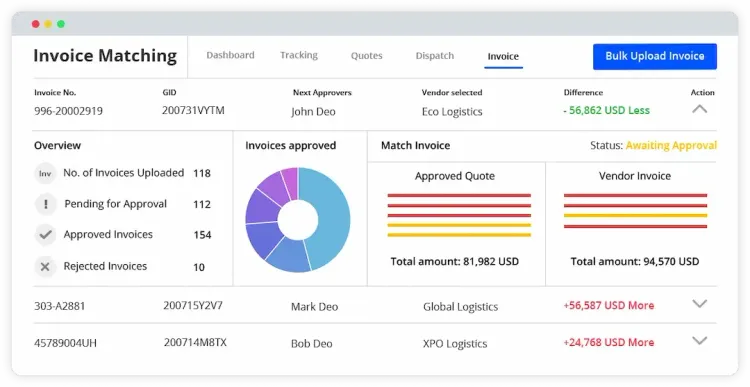
Freight Broker vs. Freight Forwarding Software
Freight broker software streamlines the connection between shippers and carriers, ensuring reliable services at competitive rates. In contrast, freight forwarding software oversees comprehensive international shipping tasks, encompassing goods handling, storage, and multi-stage transportation.
All of these software solutions improve business processes by letting freight management companies manage the operations and transportation related to shipping goods via trucks, airlines, boats, trains, and more. They also include modules for vehicle maintenance, routing and mapping, warehousing, and electronic data interchange. Alternatively, freight broker software options may be better suited for your needs.
Primary functionality included in freight forwarding systems includes modules to handle the operations (logistics), financials (accounting), and customer service involved in managing a transportation and shipping business. This can include managing master and house contracts, storing information on vendors such as their contact details and their shipping rates, recording details about cargo such as freight costs and weight, compliance documents, and customer sales and rate information.
Benefits
Some of the benefits of freight forwarding software include:
Increased Automation and Efficiency
Given the relationship with logistics software and transportation management software, freight forwarding software can be seen as an industry-specific ERP application for freight forwarders.
Freight forwarding systems that connect internal modules eliminate the need for double-entry data. Sales personnel can convert a quote into an order, which is then sent to a shipyard to begin the fulfillment process. The accounting department can easily track paid and unpaid invoices from these orders and ensure the company is not missing any payments.
Moving all shipping information via an electronic system will also help keep your data secure and stored safely. Manual shipping methods include various paperwork, including original quotes, sales orders, bills of lading, and warehouse documents.
Keep Better Tabs on Your Shipments
Incorporating all shipping methods your business uses (such as road, rail, ocean, and air) within your freight management software will allow you to better track where all your shipments are at any given time. Consolidating and optimizing shipments for time-saving purposes and cost-effectiveness can be the difference between repeat business and clients.
Gain a Competitive Edge on Your Competition
A scalable implementation lets your business save on initial costs and ramp up your needs as you become more successful. You may begin to discover key areas your business can improve through built-in analytics features.
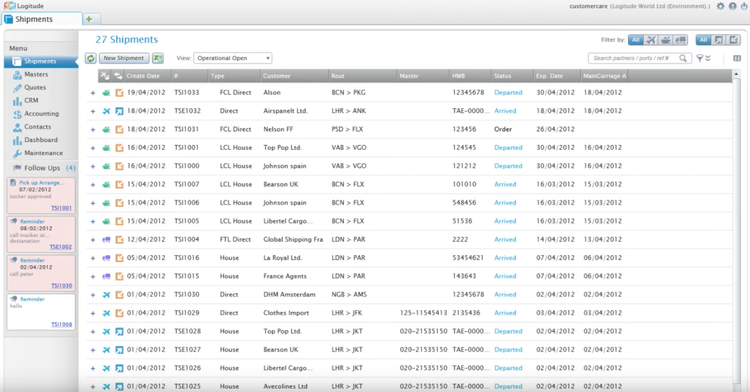
5 Reasons to Implement Software
Businesses need freight forwarding software for automation, real-time tracking, documentation and compliance, risk management, and cost savings. Below are the top 5 reasons to implement a freight forwarding software:
- Efficiency and Automation: Modern freight forwarding software automates many of the routine processes, such as booking, tracking, and billing. This reduces manual data entry, minimizes errors, and speeds up operations.
- Real-time Tracking: Customers expect to be able to track their shipments in real time. Freight forwarding software offers tracking capabilities, providing both your team and your customers with up-to-date information on shipment locations and status.
- Documentation and Compliance: Shipping internationally involves a lot of paperwork, from invoices to customs documentation. Freight forwarding software can automate and streamline these documents’ creation, storage, and retrieval, ensuring compliance with regulations and reducing the risk of penalties or shipment delays.
- Risk Management: The software can provide alerts for potential disruptions, such as weather events or geopolitical issues, allowing your company to adjust routes or schedules and minimize risks proactively.
- Cost Savings: With features such as route optimization and carrier comparison, freight forwarding software can help you identify cost-effective shipping options.
Pricing Guide
The cost of freight forwarding software varies depending on the size of your shipping operations, the number of shipments you handle, the number of users who require concurrent access, and the level of included services, such as support and hosting. It will also depend on the functionality included and any necessary integrations with external systems.
Entry-Level Tier
- Number of Users: 1–10 users
- Average Yearly Cost: $3,000–$12,000 per year
- Examples: Logitude World Basic, GoFreight Starter, FreightPrint Basic
Mid-Tier
- Number of Users: 10–50 users
- Average Yearly Cost: $15,000–$50,000 per year
- Examples: GoFreight Professional, Magaya Supply Chain, Scope Standard
High-Tier
- Number of Users: 50–200 users
- Average Yearly Cost: $50,000–$200,000 per year
- Examples: Magaya Digital Freight Platform, CargoWise Single-Region, Scope Advanced
Enterprise Tier
- Number of Users: 200+ users / global operations
- Average yearly Cost: $200,000–$1M+ per year
- Examples: CargoWise Global Enterprise, Magaya Custom Deployment, SAP Transportation Management





















































